Articles
- Page Path
- HOME > J Korean Acad Community Health Nurs > Volume 21(4); 2010 > Article
-
Original Article
- The Effects of Health Behavior-related Characteristics, Self-esteem, Activities of Daily Living, and Family Support on Depression in the Community-dwelling Elderly
- So Young Lee
-
Journal of Korean Academy of Community Health Nursing 2014;21(4):489-501.
DOI: https://doi.org/10.12799/jkachn.2010.21.4.489
Published online: April 4, 2014
Assistant Professor, Department of Nursing, Kkottongnae Hyundo University of Social Welfare, Korea.
• Received: October 15, 2010 • Revised: December 16, 2010 • Accepted: December 16, 2010
© 2010 Korean Academy of Community Health Nursing
This is an Open Access article distributed under the terms of the Creative Commons Attribution Non-Commercial License (http://creativecommons.org/licenses/by-nc/3.0/) which permits unrestricted non-commercial use, distribution, and reproduction in any medium, provided the original work is properly cited.
- 681 Views
- 1 Download
- 5 Crossref
Abstract
-
Purpose
- The purpose of this study was to investigate the effects of health behavior-related characteristics, self-esteem, activities of daily living, and family support on depression in the community-dwelling elderly.
-
Methods
- The participants were 229 elders sampled from Seoul and other five provinces. A structured questionnaire was used to collect data, and data were analyzed by applying t-test, ANOVA, Pearson correlation coefficient, and stepwise multiple regression with SAS 8.12.
-
Results
- There was a negative correlation between depression, MMSE-K, self-esteem, ADL, IADL, and family support. Depression and health behavior-related characteristics showed a significant difference according to stress level and the reason of stress. Major factors that affected the elders' depression were self-esteem, the amount of alcohol drinking, sleeping hours, ADL and the cognition of health status, which explained 59.4%.
-
Conclusion
- Based on the findings of this study, self-esteem and health behavior-related characteristics including alcohol drinking, sleeping hours and ADL were the influencing factors of depression in the community-dwelling elderly. Therefore, effective psychological and physical health promotion methods need to be developed and applied in nursing interventions to prevent depression in the community-dwelling elderly.
-
This research was supported by Research Fund of Kkottongnae Hyundo University of Social Welfare, 2009 (KURI2009-005).
NOTES
- 1. Bae JN. Accuracy of geriatric depression scale, Korean version (GDS) in the assessment of DSM-III-R major depression. Seoul: Seoul National University; 1996. Unpublished master's thesis.
- 2. Breslow L, Enstrom JE. Persistence of health habits and their relationship to mortality. Prev Med. 1980;9:469–483. ArticlePubMed
- 3. Cho MJ, Bae JN. Impact of socio-cultural changes on mental health of the elderly in Korea. Ment Health Res. 1994;13:82–96.
- 4. Cho MJ, Bae JN, Suh GH, Hahm BJ, Kim JK, Lee DW, et al. Validation of geriatric depression scale, Korean version(GDS) in the assessment of DSM-IIIR major depression. J Korean Neuropsychiatr Assoc. 1999;38(1):48–63.
- 5. Choi I, Kim YS, Suh KH. The psychosocial factors affecting suicidal ideation of the elderly. Health Soc Sci. 2009;25:33–56.
- 6. Hur JS, Yoo SH. Determinants of depression among elderly persons. Ment Health Soc Work. 2002;13(6):7–35.
- 7. Folstein MF, Folstein SE, McHugh PR. "Mini-mental state": A practical method for grading the cognitive state of patients for the clinician. J Psychiatr Res. 1975;12:189–198. PubMed
- 8. Jang MH, Won JS. Association of anger and anger expression, social support, self-esteem, and depression in elderly. J Korean Acad Psychiatr Ment Health Nurs. 2009;18(3):259–268.
- 9. Jeon HS, Kahng SK. Predictors of depression trajectory among the elderly using the Korean welfare panel data. J Korean Gerontol Soc. 2009;29(4):1611–1628.
- 10. Jon BJ. Self-esteem: A test of its measurability. Yonsei Nonchong. 1974;11(1):107–130.
- 11. Katz S, Ford AB, Moskowitz W, Jackson BA, Jaffe MW. Studies of illness in the aged. The index of ADL: A standardized measure of biological and psychosocial function. JAMA. 1963;185:914–919. ArticlePubMed
- 12. Kim DB, Sohn ES. A meta-analysis of the variables related to depression in elderly. J Korean Gerontol Soc. 2005;25(4):167–187.
- 13. Kim HS, Kim BS. The effects of self-esteem on the relationship between the elderly stress and depression. J Korean Gerontol Soc. 2007;27(1):23–37.
- 14. Kim MA, Kim HS, Kim EJ. Cognitive function and depression in the elderly. J Korean Gerontol Nurs. 2005;7(2):176–184.
- 15. Kim YS, Yoo MS, Park JH. Factors influencing depression in community-dwelling elderly with low income. J Korean Gerontol Soc. 2009;29(4):1313–1325.
- 16. Kwon YE, Ha J, Ahn SY. A study of the perceived health status, activities of daily living, depression for the elderly at home. J Korean Gerontol Soc. 2007;27(2):335–343.
- 17. Lawton MP, Brody EM. Assessment of older people: Self-maintaining and instrumental activities of daily living. Gerontologist. 1969;9(3):179–186. ArticlePubMed
- 18. Lee HJ, Lee JY. The effects of socioeconomic position and health behavior on geriatric depressive symptom. J Korean Gerontol Soc. 2008;28(4):1129–1145.
- 19. Lee KJ, Park HS. A study on the perceived health status, depression, and activities of daily living for the elderly in urban area. Korean J Women Health Nurs. 2006;12(3):221–230. ArticlePDF
- 20. Ministry of Health and Welfare. 2008. National elderly living conditions survey (11-1351000-000316-12). Seoul: Ministry of Health and Welfare; 2009a.
- 21. Ministry of Health and Welfare. 2010 National elderly welfare facilities survey (11-1352000-000002-10). Seoul: Ministry of Health and Welfare; 2009b.
- 22. Moon SK, Chung JE, Sohn ES. Analysis of the mediating effects of family support and social participation between daily hassles and depression for the elderly with stroke disabilities. Korean J Fam Welf. 2008;24(4):223–248.
- 23. Park JH, Kwon YC. Standardization of Korean version of the mini-mental state examination (MMSE_K) for use in the elderly. Part II. Diagnostic validity. J Korean Neuropsychiatr Assoc. 1989;28(3):508–513.
- 24. Park MJ. Buffering effects of strengths and social support between stress and depression of the elderly women. Korean J Woman Psychol. 2007;12(2):197–211.
- 25. Rosenberg M. Society and adolescent self image. Princeton, NJ: Princeton University Press; 1965.
- 26. Seo JM, Kim MH, Kim JS. Discriminating power of depression of elderly women by arthralgia, physical function and physical self-efficacy. J Korean Acad Psychiatr Ment Health Nurs. 2006;15(3):237–245.
- 27. Shin KR, Kang Y, Jung D, Choi KA. A study on the depression, somatic symptom, activities of daily living for the elderly women in an urban area. J Korean Acad Nurs. 2007;37(7):1131–1138. ArticlePubMedPDF
- 28. Sohn SH. Differences in cognitive function and activities of daily living between two groups without depression among patients with senile dementia. Seoul: Ewha Womans University; 1998. Unpublished master's thesis.
- 29. Won JS, Kim KH. Evaluation of cognitive functions, depression, life satisfaction among the elderly receiving visiting nursing services. J Korean Acad Nurs. 2008;38(1):1–10. ArticlePubMed
- 30. Yesavage JA, Brink TL, Rose TL, Lum O, Huang V, Adey M, et al. Development and validation of a geriatric depression screening scale: A preliminary report. J Psychiatr Res. 1982-1983;17(1):37–49. ArticlePubMed
Figure & Data
References
Citations
Citations to this article as recorded by 

- Factors related to Depression of Rural Elders
Ji-Ae Son, Soon-Rim Suh, Mihan Kim
Journal of Korean Gerontological Nursing.2015; 17(1): 56. CrossRef - Effects of Cognitive Function and Depression on Anxiety in Elderly People-Convergent approach
Jeong-Sook Lee, Sun-Young Lee
Journal of Digital Convergence.2015; 13(8): 401. CrossRef - Prevalence of Depression and its Risk Factors among Aged at Social Service Centers in One Urban Community
Hye-Ryoung Kim
The Korean Journal of Rehabilitation Nursing.2013; 16(2): 79. CrossRef - Gender Difference in Risk Factors for Depression in Community-dwelling Elders
Chul-Gyu Kim, Seungmi Park
Journal of Korean Academy of Nursing.2012; 42(1): 136. CrossRef - Effects of an Empowerment Program on Self-esteem and Depression for Low-income Elderly Women Living Alone
Sang-Hwa Lee, Seong-Sook Jun
Journal of Korean Academy of Psychiatric and Mental Health Nursing.2012; 21(4): 311. CrossRef

 KACHN
KACHN
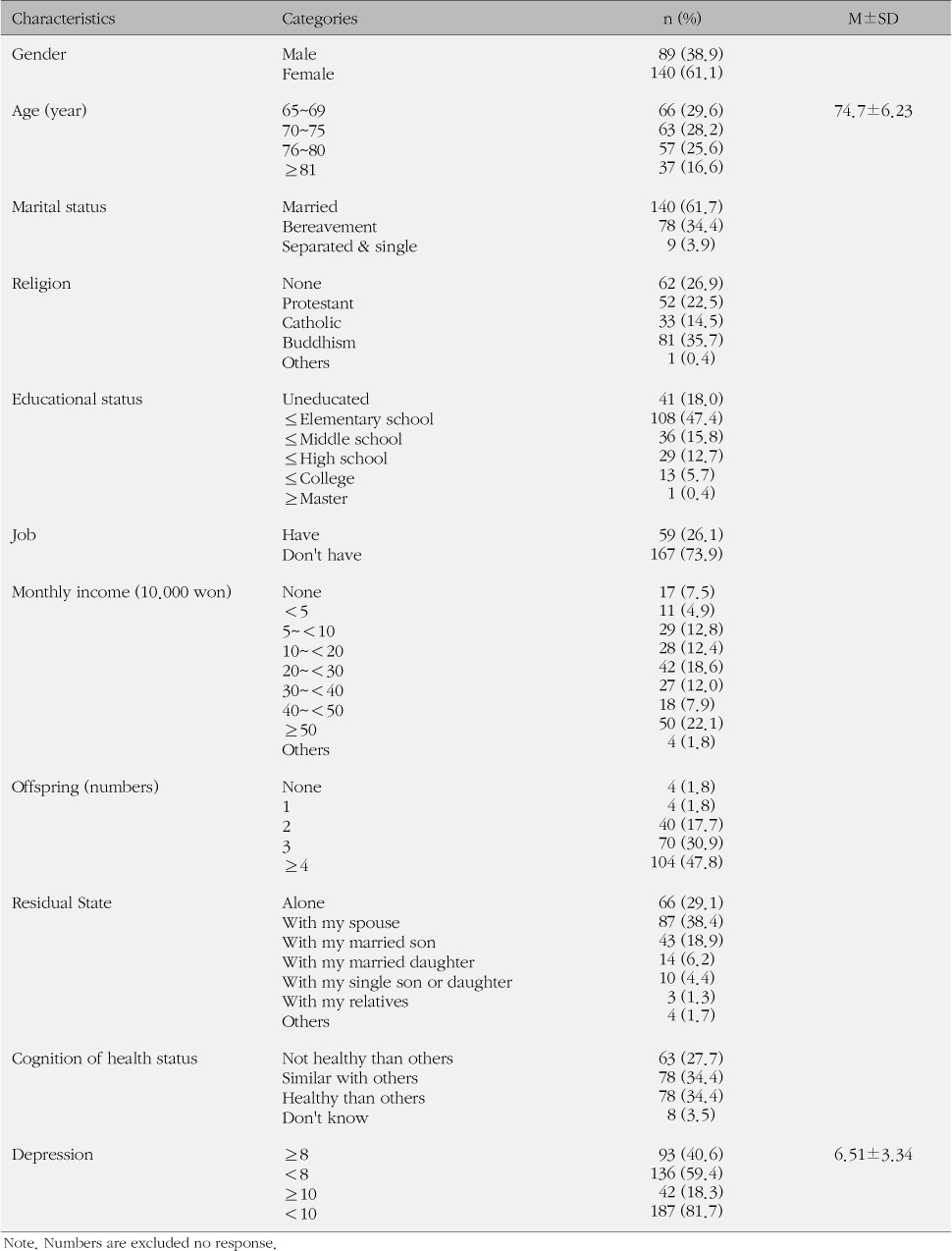
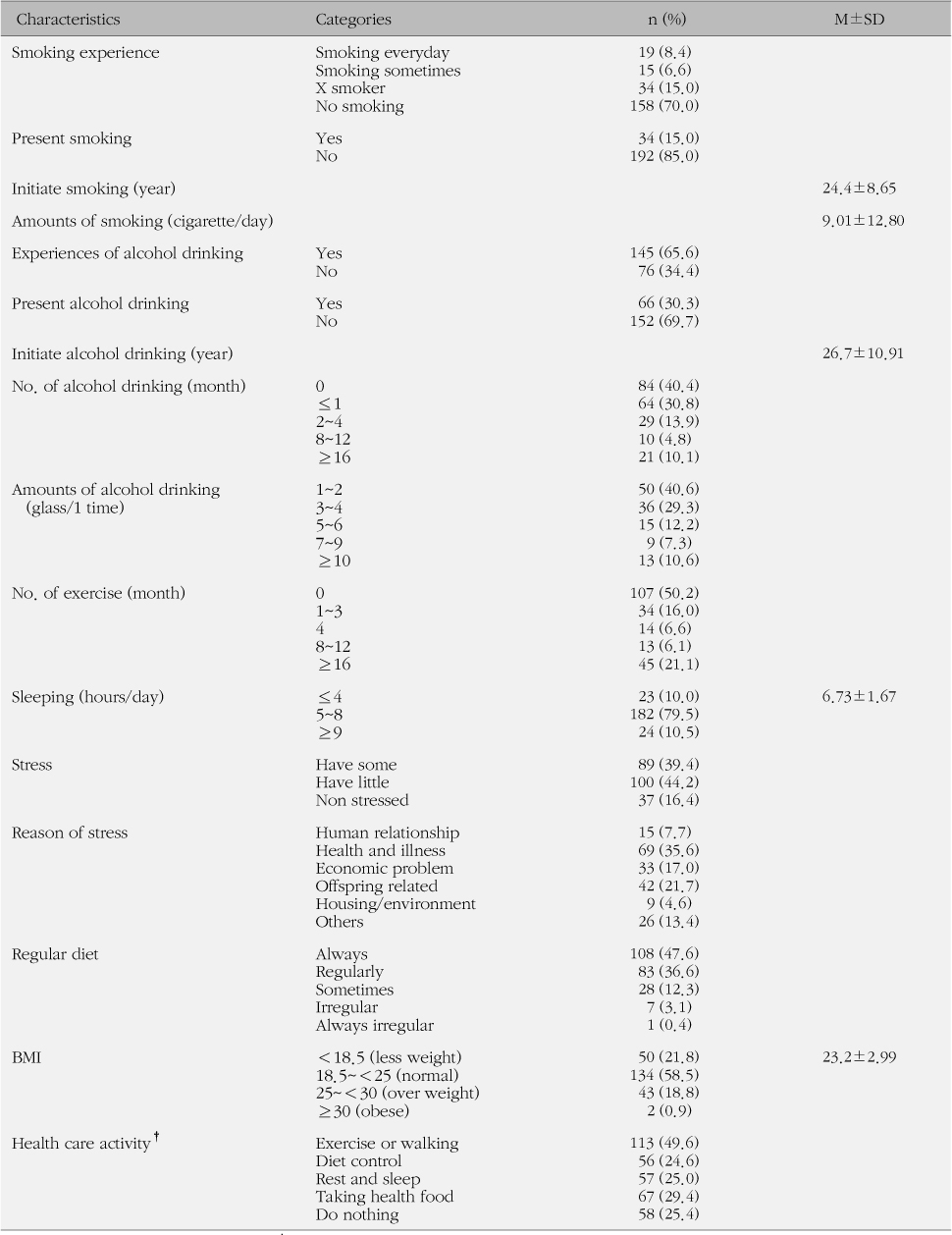
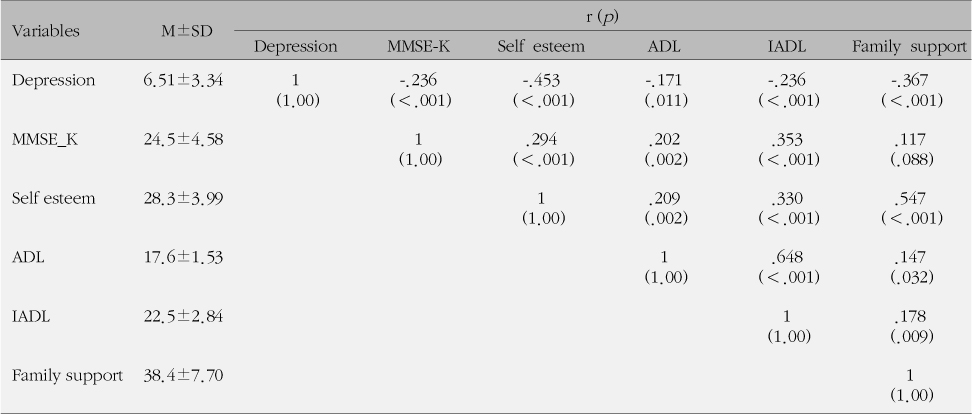
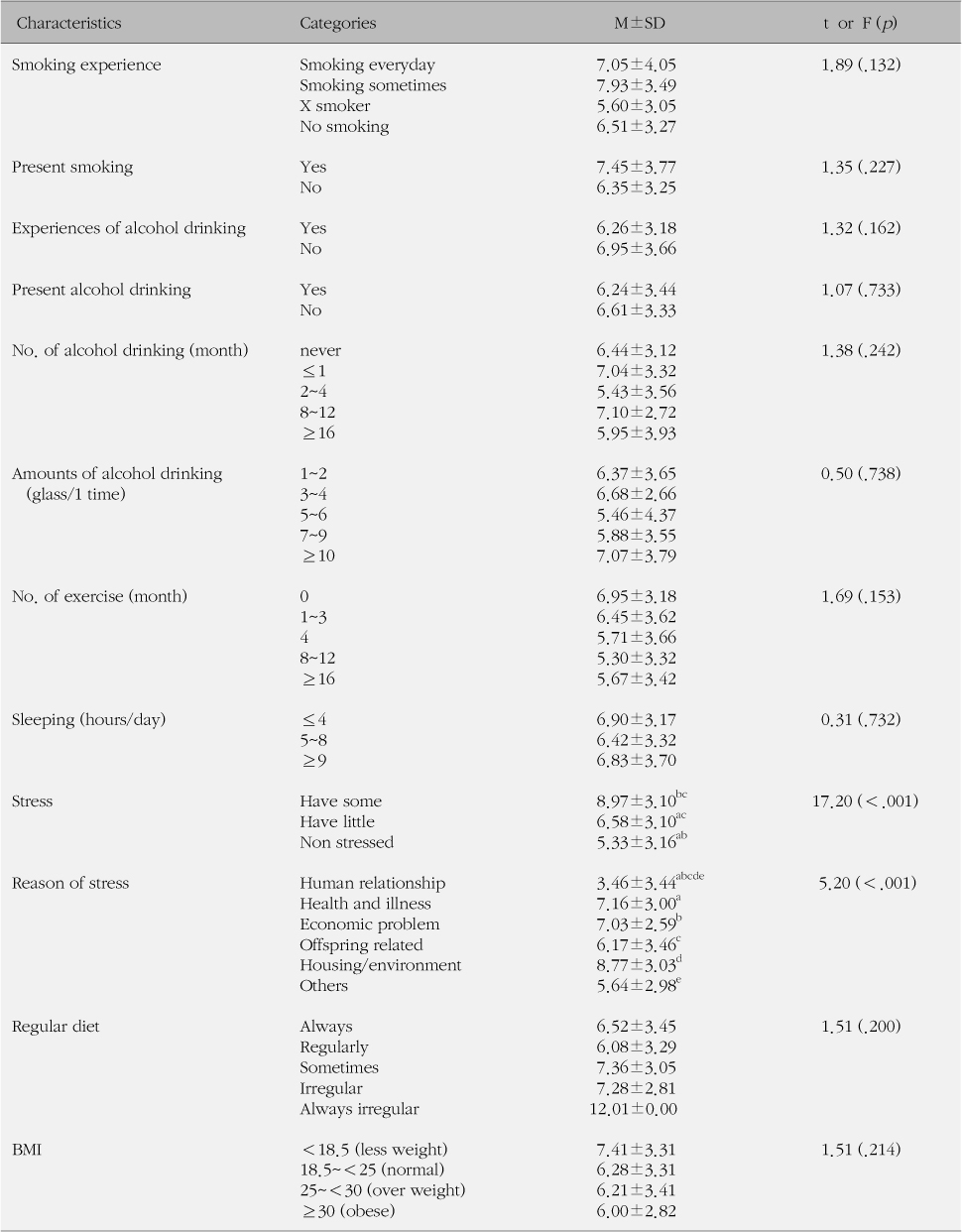
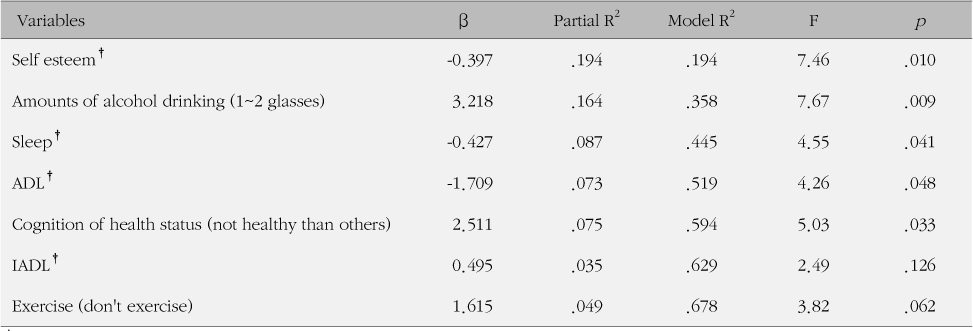
 PubReader
PubReader Cite
Cite

